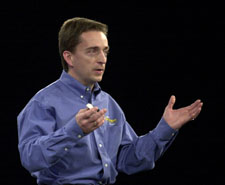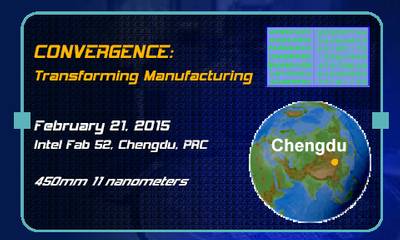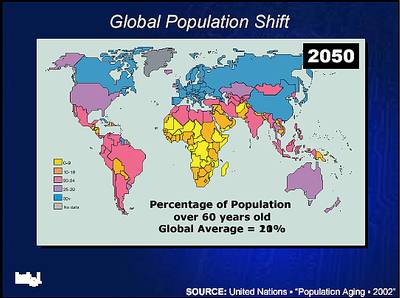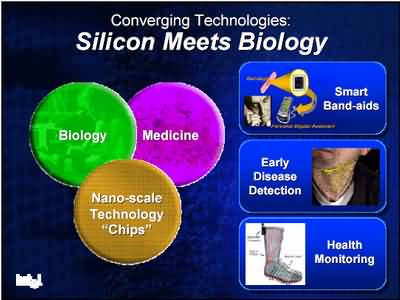Itís the end of the shortest and from many points informal day of IDF dedicated to research and sci & tech prospects.
By tradition, this all-important keynote was presented by Patrick Gelsinger, Senior Vice President, Chief Technology Officer and the R&D "brain" of Intel. Itís interesting that Patrick passed all career stages from a usual engineer, that worked at a Pennsylvania ranch at his 15, to Head of R&D, the most crucial in the company.

In his speech he discussed different convergence levels of computing and communications, and new usage models. He mentioned that combined growth of connections amount and PC performance bursts into rapid growth of features. This resembles Mooreís law additionally powered by the level of networking growth law (each year the amount of connections doubles).

As for less abstract things, Patrick presented various Intel´s biology researches. This field of health care becomes more and more important for humanity (whose middle age gets higher in a constant pace Ė humanity olders amd older.)

A simple example is an intelligent sensor-packed house, tracking your old parents, informing you of any suspicious behavior variations; a TV reminding you to measure your blood pressure or take a pill; etc.
When I asked him how "critical" these appliances are, considering they require far more reliability and stability than we have now in simpler computing and communication (such error might worth a human life! As you remember, Pentium disclaimer states these CPUs canít be used in life-critical devices), Patrick answered that Intel had been deaing with critical appliances as well, for example, in the server field, and would be able to develop both wonderful and reliable health care technologies in the future. The latter aspect will be paid most attention, when it gets to real products.
However, Intel doesn´t make operating systems. I personally would be feeling uneasy having some Windows for Home Health Care in my TV ;). Just imagine: "Today, 03:00PM, you should take —1.454e-19 pills. Fatal exception..."
On the other hand, when debugged and globally deployed, these technologies will help people taking care of aged parents, and they will also be of help in retirement homes or hospitals. We can only welcome Intel in sponsorship of these researches. Unlike many other companies that didnít know where to invest vast sums earned due to information boom, Intel has a clear vision of the future, focusing on making world better in points where it intersects with its interests.

Another interesting medical usage of Intel´s developments Ė blood or DNA analysis chips. Imagine you touch a device and get information on your temperature and blood pressure (such chips already exist) as well as about blood composition and possible problems of your body (substance imbalance, virus disease and even cancer detection on early, ofren curable stages).
